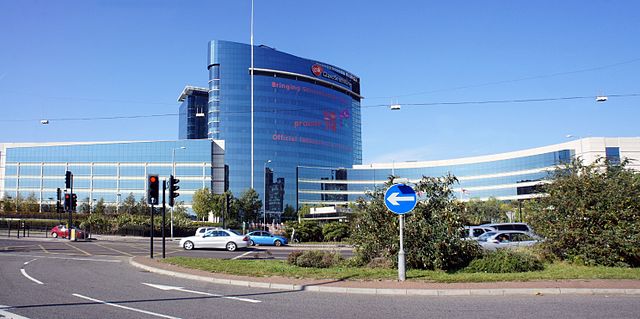
(Photo from Wikipedia)
GlaxoSmithKline could seek regulatory approval for up to 20 new medicines before 2020 and some could hit the market by then, enabling it to boost revenue rather than just compensate for declining sales of its older drugs.
The British drugmaker said it could start late-stage patient testing in the next two years on about 20 new drugs or new uses for existing ones. And it could start mid-stage patient testing on about 30 others.
Executives of GlaxoSmithKline Plc, the world’s sixth-biggest drugmaker by revenue, presented an update Tuesday on progress in developing new medicines and vaccines. They’re needed because the company’s longtime mainstay, asthma inhaler Advair, which had provided about 23 per cent of revenue, is bringing in less money as payers demand lower prices. Sales fell from about $5.2 billion in the first nine months of 2014 to about $4.1 billion in 2015’s first nine months, and newer respiratory drugs aren’t picking up the slack.
Meanwhile, generic competition to Advair looms, other big drugs already have lost patent protection—and sales to cheaper generics—and Glaxo’s stock price keeps falling. Shares traded in the U.S. are down 24 per cent over the past 20 months, including another 1.5 per cent drop Tuesday. Those all have been putting pressure on CEO Andrew Witty to produce better results or face an ouster.
“We need to make sure we have a company that is vibrant and in growth post-Advair,” Witty, GSK’s chief executive officer since 2008, told analysts and journalists during a presentation in New York.
The company has been pruning its research programs, cutting jobs and reducing other costs under a restructuring begun last year, an attempt to counter declining revenue and free up more money for research.
The restructuring included a big swap this year with rival Novartis AG. Glaxo transferred its portfolio of approved cancer drugs to Novartis in exchange for the Novartis vaccines business. The two companies also created a joint consumer health care business, among the world’s largest, that combines their products, including Glaxo’s Aquafresh toothpastes and Boost nutrition drink, and Novartis products Excedrin pain reliever, TheraFlu cough and cold medicines, and Benefiber fiber supplement.
On Tuesday, GlaxoSmithKline presented details on 40 experimental medicines in the company’s six core areas: HIV and infectious diseases, respiratory disorders, rare diseases, vaccines, cancer and the hot new category of cancer medicines that work by harnessing the immune system to better fight tumors.
“We all know not all of these assets will make it,” Witty said, adding that Glaxo had an industry-leading 14 new drugs approved from 2010 through 2014. Those included a pandemic flu vaccine, Tivicay for HIV, and respiratory treatments Breo and Anoro.
Sanford Bernstein analyst Dr. Timothy Anderson wrote to investors that caution about Glaxo’s upbeat presentation is warranted, particularly on its drugs in initial testing, because in general those rarely get approved. He noted “GSK’s prior R&D track record, where promises of superior pipeline output … never quite played out.”
Witty noted that about 80 per cent of the experimental drugs now in testing “have the potential to be first-in-class” drugs that work by new mechanisms, and some could transform how patients are treated.
Among the highlights:
A new antibiotic targeting multiple bacterial infections, gepotidacin, will start late-stage testing, usually the final round before seeking approval, next year.
Initial patient studies are in progress for two drugs that use epigenetics, the control system that determines cell function. One is for solid tumors and blood cancers; the other is being tested against small cell lung cancer and leukemia.
One drug that stimulates the immune system to better fight cancer is in early testing against five types of cancer and another is to be tested in eight cancer types.
An injected drug is in mid-stage testing for rheumatoid arthritis, and four antibody-based drugs are in initial testing against various inflammatory disorders.
In addition, Glaxo plans to seek approval in the second half of 2016 for Shingrix, a vaccine against the painful viral disease shingles, and the company is working on vaccines for pregnant women to protect their newborns from multiple infections in their first weeks.
Also, Tuesday, ViiV Healthcare, which is partly owned by Glaxo, announced preliminary testing of two long-acting injectable drugs—one from ViiV and one from Johnson & Johnson—indicating that it might be possible to keep HIV at bay indefinitely with injections every month or two.
Asked about plans for acquisitions, Patrick Vallance, president of drug research and development, said he doesn’t see significant gaps in GSK’s research pipeline.
“We’re not going on a shopping spree” for late-stage experimental drugs being developed by outside researchers, he said.